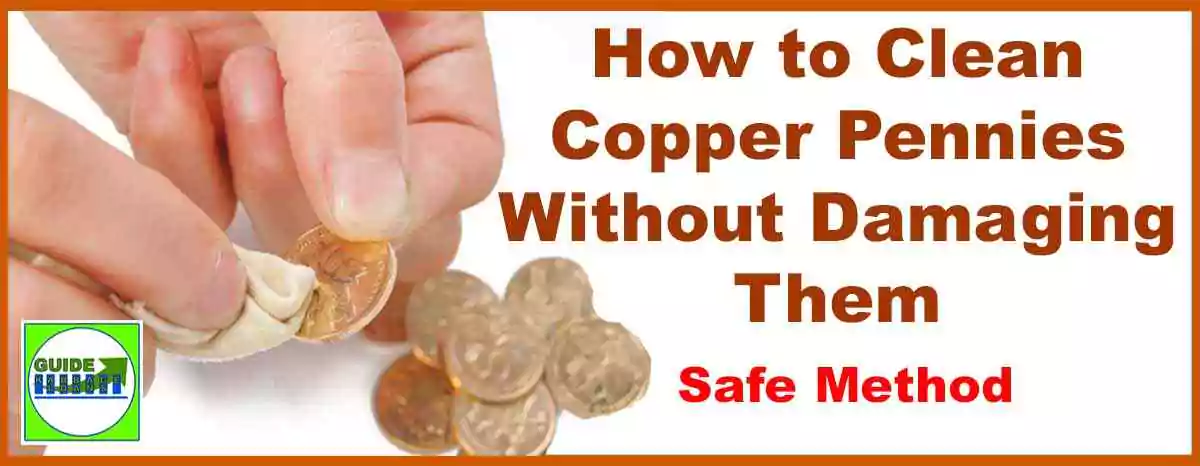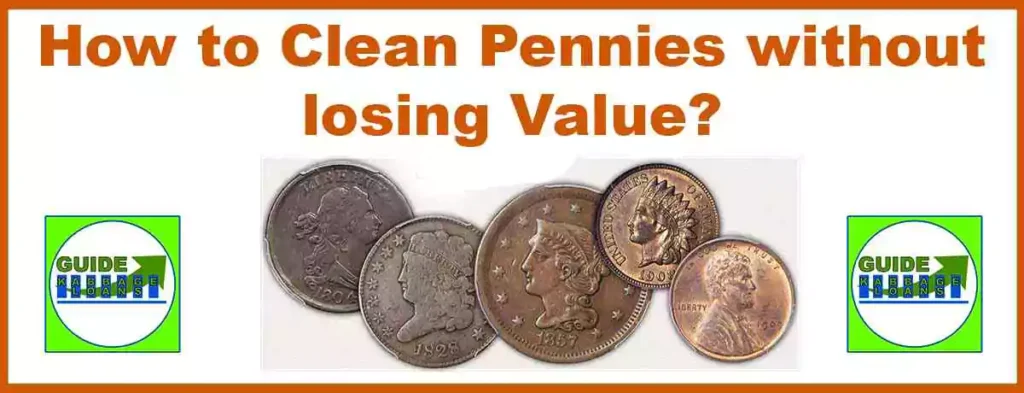Cleaning old pennies can be a fascinating activity for numismatists, collectors, or individuals looking to restore the luster of their copper and bronze coins. However, it’s crucial to approach the cleaning process with caution, as improper methods can potentially decrease the value of the coins. In this comprehensive guide, we will explore, how to clean pennies without losing value. And addressing common questions and providing effective, value-preserving methods for copper, bronze, and all types of old pennies.
Table of Contents
ToggleHow Can I Clean Old Pennies?
To clean old pennies effectively, you can create a simple yet powerful cleaning paste using baking soda. Begin by adding a small amount of water to a tablespoon of baking soda, forming a paste with a thick consistency. Once the paste is ready, carefully apply it to each coin, ensuring that the entire surface is covered. For the cleaning process, an old toothbrush works wonders.
Gently scrub the coins with the toothbrush, allowing the baking soda paste to work its magic on the accumulated grime and tarnish. After a thorough scrubbing, the next step is crucial for revealing the penny’s renewed shine. Rinse the coins under running water, ensuring that all remnants of the baking soda paste are washed away.
Why Is Penny Cleaning Difficult?
Penny cleaning proves to be a challenging task primarily due to the nature of the discoloration on the coins. Contrary to common perception, the brown layer encrusting pennies is not a result of soil or dirt accumulation but rather tarnish, specifically copper oxides. Even after a meticulous cleaning process, the persistent brown hue prevails because it is an inherent part of the tarnish, not a superficial layer of dirt.
This distinction is crucial to understand – the coloration is deeply ingrained into the metal, and traditional cleaning methods may not eliminate this characteristic patina. Hence, the difficulty in achieving a completely blemish-free, shiny surface on cleaned pennies.
What Is the Easiest Way to Clean Pennies?
The easiest way to clean pennies involves a simple and effective homemade solution. Start by preparing a cleaning mixture using readily available household items. In a cup or glass, add a quarter cup of white vinegar or lemon juice, both of which contain mild acids beneficial for breaking down oxidation on the pennies. To this liquid, mix in a teaspoon of salt, stirring until it dissolves completely.
Next, carefully place your pennies at the bottom of the cup or glass, ensuring they are not stacked on top of each other. This arrangement ensures that each penny receives equal exposure to the cleaning solution. Allow the pennies to soak in the mixture for approximately five minutes. After this short duration, check the pennies to observe the cleaning progress.
Does Cleaning Pennies Reduce Value?
The simplest approach to cleaning pennies involves acknowledging the advice of appraisers and coin experts. It’s widely recommended not to undertake the cleaning of collectible coins independently, as this can potentially diminish their value. The use of chemical cleaners or abrasive scrubbing methods may inadvertently result in visible scratches and marks on the coin’s surface, a detail that would be readily apparent to a skilled coin appraiser.
So, the easiest way to clean pennies, particularly those with potential collectible value, is to exercise caution and seek professional guidance to avoid unintentional damage and loss of historical worth.
Why Does Cleaning Coins Decrease Value?
Cleaning coins often results in a decrease in their value due to several compelling reasons. These factors are summarized below:
1. Abrasive Cleaning Products
Many cleaning products contain abrasive agents that, when applied, can inadvertently scratch the surface of coins. These scratches compromise the coin’s originality, leading to a reduction in its overall value.
2. Potential for Damage
Cleaning, especially when done without precision, poses a significant risk of damaging the coins. Even seemingly gentle methods may cause unintended scratches or marks that collectors find undesirable, diminishing the coin’s numismatic appeal.
3. Reaction with Other Metals
Non-abrasive cleaners, while seemingly less harmful, can react poorly with the various metals present in coins. This chemical reaction may alter the coin’s composition, tarnishing its appearance and further diminishing its collectible value.
How to Clean Pennies Without Losing Value?
There are several methods available for cleaning old pennies. But you should know that when cleaning pennies, their value reduces. Because the chemicals used in cleaning like caustic etc. cause great harm to pennies. But in the USA, there are still some methods by which you clean pennies without losing value.
Here are some methods to clean pennies without losing value:
Distilled Water Method:
To clean your coins gently, start by using only water. Follow these steps:
- Grasp the coin by the edges to avoid direct contact with the surface.
- Hold the coin under a gentle stream of lukewarm distilled water.
- Flip the coin to ensure both sides are wet.
- Gently pat the coin dry with a soft cotton towel.
This method is effective for removing superficial dirt without risking damage to the coin’s surface.
Hydrogen Peroxide Method:
Hydrogen peroxide can be used to remove stains and tarnishes without damaging the coin’s surface. Follow these steps:
- Use a diluted form of hydrogen peroxide instead of concentrated.
- Soak the coins in the diluted solution for a brief period.
- Gently pat the coins dry with a soft cloth.
This method is suitable for tackling stains and tarnish effectively.
Salt and Vinegar Method:
Copper oxide dissolves in a mixture of weak acid and table salt, and vinegar provides the required acidity. Alternatively, you can use salt and lemon juice or orange juice, as they also contain acids. Follow these steps:
- Create a mixture of salt and vinegar or salt and lemon juice.
- Allow the pennies to soak in the solution briefly.
- Gently scrub if necessary.
- Rinse with water and pat dry.
This method helps dissolve oxidation and restore the shine without causing damage.
Why Does Vinegar Clean Pennies?
When copper undergoes oxidation, a natural process that occurs over time, it takes on a distinctive blue-green hue, forming a compound known as malachite. The discoloration and the appearance of dirty-looking spots on the penny are a result of this oxidation. However, when vinegar and salt are combined in Bowl 2, a fascinating chemical reaction ensues.
This reaction plays a dual role in the cleaning process: it effectively dissolves the copper oxide, eliminating the unsightly spots, while also acting on the outer layer of copper present on the penny. The outcome of this chemical interaction is nothing short of remarkable – a formerly tarnished and dull penny emerges with a renewed, shiny appearance. Essentially, the vinegar’s acidity works to break down and dissolve the copper oxide, unveiling the inherent brilliance of the coin.
How to Clean Pennies Without Vinegar?
If you find yourself without vinegar, fret not—lemon juice can serve as an excellent alternative for cleaning pennies. The key lies in the presence of weak acids, such as acetic acid in vinegar or citric acid in lemon juice, both of which effectively dissolve copper oxide, the stubborn residue tarnishing your pennies.
The acidity in lemon juice, akin to that in vinegar, facilitates the breakdown of the oxidation, offering a viable and accessible solution for restoring the gleam to your coins. The versatility extends to even orange juice, proving that the quest for a brilliantly clean penny doesn’t necessarily hinge on a specific acidic source. So, armed with a citrus twist, you can confidently embark on the journey to revive your pennies’ shine sans vinegar.
How to Clean Silver Coins Without Losing Value?
To clean silver coins without compromising their value, one recommended method involves a gentle soaking process using warm distilled water and mild soap. Begin by adding a few drops of mild soap, ensuring it is not a harsh detergent, to a glass of warm distilled water. Carefully place the silver coins into the solution, allowing them to soak.
How to Clean Copper Pennies Without Damaging Them?

To clean copper pennies without causing damage, one effective method involves utilizing a mixture of weak acid and table salt. Copper oxide, which contributes to the tarnish of pennies, dissolves when exposed to a mild acid. Vinegar, being an acid, serves as an excellent option for this purpose. The process involves combining one cup of white vinegar with one tablespoon of salt in a jar, stirring until the salt is dissolved.
How to Clean Bronze Pennies?
When it comes to cleaning bronze pennies, a gentle soaking method can be highly effective without compromising the integrity of the coins. To start, consider using olive oil, WD40, or distilled water as your cleaning solution. Opt for distilled water over tap water or spring water to ensure a purer and more controlled environment for the soaking process.
Begin by submerging your bronze pennies in the chosen solution, allowing the liquid to work its magic in breaking down the accumulated dirt and oxidation. It’s important to exercise patience during this step, as the soaking duration plays a crucial role in achieving optimal results.
Conclusion.
Cleaning pennies without losing their value requires careful consideration and the right techniques. While methods like using distilled water, hydrogen peroxide, or a mix of salt and vinegar can restore shine, it’s vital to understand the risks involved. Tarnish and patina often hold historical and collectible significance, so improper cleaning may diminish a coin’s worth.
FAQs.
Can I use regular cleaning products on pennies?
It is not recommended. Regular cleaning products can damage the surface of coins and reduce their value.
How often should I clean my pennies?
Only clean pennies when necessary, as frequent cleaning can contribute to wear and potential damage.
Are there specific tools I should avoid when cleaning pennies?
Yes, abrasive tools like steel wool or wire brushes should be avoided, as they can scratch the surface of pennies and reduce their value.
Will cleaning pennies improve their market value?
Cleaning generally doesn't increase market value. Collectors often prefer coins with original patina, so cleaning should be done to preserve rather than enhance value.
Is it safe to use baking soda on copper pennies?
Baking soda can be used on copper pennies, but it's crucial to create a mild paste and apply it gently to avoid scratching. Always rinse thoroughly after cleaning.
Thanks for your visit.
(How to clean pennies without losing value?)





